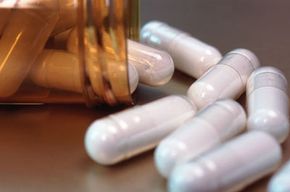Almost all of the medicines that we see and hear about on a regular basis use the bloodstream to get where they need to go. For example, if you have a headache and take aspirin to ease the pain, the way that the aspirin gets to your head is through the bloodstream. If the drug can't get into your bloodstream, it can't do its job.
Drug Image Gallery
Advertisement
There are five different ways that a drug can make its way into the bloodstream:
- Pills and capsules - The medicine is absorbed by the stomach lining and the small intestine and enters the bloodstream.
- Inhalants - The medicine enters the bloodstream through the lungs (in the same way oxygen enters the bloodstream when you breathe).
- Shots - The medicine is injected into the lymph around the cells, is collected in lymph ducts and makes its way into the bloodstream as the lymph is recycled.
- Intravenous (IV) - The medicine enters the bloodstream by direct injection into a vein.
- Suppository - The medicine enters the bloodstream through the lining of the large intestine.
- Dermal patch - The medicine migrates through the skin and enters the lymph or the bloodstream.
Pills are probably the most common way to package drugs, and nearly all over-the-counter medicines come this way. In order for a drug to work as a pill, it needs two features:
- The drug's molecule must be small enough to make it through the stomach lining or intestinal lining.
- The drug's molecule must be unaffected by acid in the stomach.
Insulin is a good example of a drug that doesn't work as a pill. Insulin is a hormone produced by the pancreas. People with diabetes do not produce enough insulin. The insulin molecule is large and sensitive to acid, so an "insulin pill" won't work. Currently, diabetics who need to take insulin must inject the hormone, although recent research has created an inhalable form.
For more information on drugs and how they're administered, along with related topics, check out the links on the next page.
Advertisement
